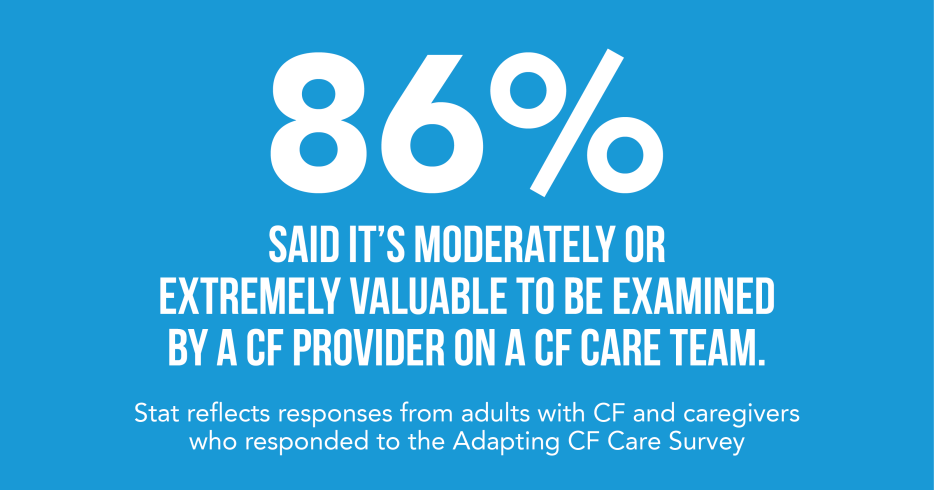Update May 30, 2025 — Full survey results and two CF Foundation position papers covering the CF care model and the CF care team were published in November 2024. Learn more about these position papers and what they mean for people with CF.
May 16, 2024 — The Cystic Fibrosis Foundation conducted a national survey of people with cystic fibrosis, families, and clinicians to understand how CF care centers can adapt to meet the changing needs of people with CF.
Many people with CF are experiencing significant changes to their health. As some experience better health and live longer, their needs are changing and may become increasingly complex with age. For others, their health may not have changed dramatically, so the current CF care they receive needs to be sustained.
These changes raise questions about routine visits to CF care centers, the importance of CF care teams and other health care providers, and whether care can be provided via telehealth in some cases. To gather input on these questions and more, the CF Foundation conducted the Adapting CF Care Survey in fall 2023 and is now analyzing the results.
The survey was completed by about 600 adults with CF and caregivers and about 600 clinicians, and focus groups were also held with adults, caregivers, and clinicians. The CF Foundation expects to publish a more comprehensive summary of survey results in fall 2024. Key highlights from the survey results are listed below.
Most adults with CF and caregivers still value in-person clinic visits.
Seventy-six percent of adults with CF and caregivers said routine, in-person visits to CF care centers are moderately or extremely valuable. In particular, most survey takers — patients, families, and clinicians alike — said they highly value the hands-on physical exams that take place at in-person clinic visits (more on that below).
Adults with CF and caregivers value their relationships with their CF care teams.
Eighty-six percent of adults and caregivers said it is moderately or extremely valuable to be examined by a CF provider on a CF care team. Focus group participants said they especially appreciate that care teams give peace of mind during a new diagnosis, teach children with CF to advocate for themselves, and maintain close relationships with patients over time.
Adults with CF, caregivers, and clinicians want telehealth to be an option for CF care visits.
Ninety percent of adults and caregivers and 91 percent of clinicians said telehealth should be offered by CF care centers. Benefits of telehealth cited by survey takers included reducing infection risk, saving time, and missing less work or school. Survey takers also acknowledged the challenges of telehealth, including the limitations of visits without in-person exams and the difficulty of home spirometry.
Most, but not all, adults with CF have a primary care provider.
Sixty-eight percent of adults with CF have a primary care provider, such as a family medicine doctor or internist. Primary care providers partner with — and do not replace — CF care teams. They offer preventive care services, such as cancer screening, vaccines, and heart disease risk screening, that are critical as many people with CF live longer lives.
Next steps: Interim guidance influenced by survey results.
Thank you to everyone who took the Adapting CF Care Survey. The survey results influenced the development of two CF Foundation position papers, led by a committee of CF clinicians, adults with CF, and parents of people with CF, that will provide interim guidance on the CF care model and the CF care team structure. Position papers describe best practices for CF care and are intended to guide care teams while research is being conducted to inform formal guidelines in the future.
The committee expects to publish the position papers in fall 2024. The CF Foundation hopes the position papers will help address some of the most pressing issues in the evolving nature of CF care.



